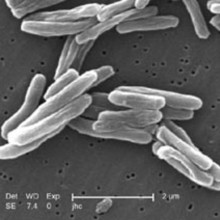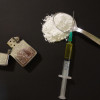Tuberculosis is a major world problem, but extremely difficult to treat - vaccines are toxic to humans, and the disease-causing bacteria have a habit of hiding in the very cells tasked with destroying them. Immune system bodyguard drugs that fend off TB before it can hide could soon be possible, according to new research. Simon Bishop speaks to Professor Kurt Drickamer about the work.
In this episode

- Immune cell bodyguards to keep out TB
Immune cell bodyguards to keep out TB
Immune system bodyguard drugs that fend off tuberculosis could soon be possible, according to new research.
TB is a major problem in both cattle and humans. In 2012, 1.3 million people globally died of the disease, according to the World Health Organization.
Mycobacterium tuberculosis, the bacterium that causes TB, is difficult to treat because it can hide inside immune cells called macrophages, the very cells tasked with destroying the disease.
Now, research in the Journal of Biological Chemistry has pinpointed where bacterial sugars connect with macrophage protein molecules. By building synthetic molecules that mimicked the connection, then slowly removing sections until the connection broke, the exact molecular target for new drugs to stand sentry could be identified.
"Potentially we could build drugs to kill the mycobacteria where they're hiding" said Professor Kurt Drickamer, at Imperial College London.
He noted that although there are other ways for Mycobacterium to enter the macrophages, this particular molecular connection also ensures its survival once inside the immune cell, allowing it to trigger the disease in the future.
Potential drugs could make macrophages uninhabitable for bacteria, as well as expose them to the active immune system.
Current TB vaccines contain mycobacteria, resulting in antibody production in the immune system in readiness for another attack. But because the disease can hide in cells, the vaccine is too toxic to be used outside of cattle.
Drickamer is hopeful that bodyguard drugs could be a less toxic treatment in human and cattle TB, as well as other diseases. Furthermore, understanding the molecular interaction might allow production of vaccines using artificial, but safe, alternative molecules that resemble the key bacterial sugars.
"Often you put Mycobacterium in animal vaccines to stimulate the immune system," Drickamer said. "If we could make a simple molecule that could mimic what the mycobacteria do, we could have the stimulatory effect but not use the bacterium at all."
The synthetic production of bacterial sugars suggests a safe TB vaccine for human use could be possible.
- Previous Cutting Edge in Cancer
- Next Gunpowder and Fireworks









Comments
Add a comment